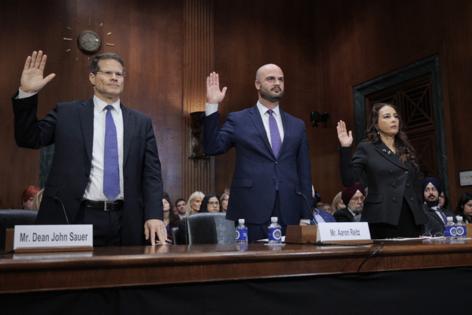Trump's DHS asks Supreme Court to intervene on deportations
Published in News & Features
WASHINGTON — The Trump administration asked the U.S. Supreme Court to block a judge’s order that requires the government to give people 10 days’ notice and an opportunity to object before they are deported to a so-called third country.
The emergency request stems from a case before a Massachusetts federal judge, who last week said that the administration violated his earlier order by attempting to send a group of migrants convicted of crimes to South Sudan.
It’s the latest Supreme Court clash to test the boundaries of the government’s power to deport people to harsh or potentially dangerous locations with minimal advance notice. The high court has said the administration must give people a “reasonable time” to challenge their deportations but hasn’t spelled out exactly what that means.
The new filing involves efforts by the Department of Homeland Security to deport people to places other than their home nation or an alternative country ordered by an immigration judge.
U.S. Solicitor General D. John Sauer told the Supreme Court the case involves “some of the worst of the worst illegal aliens,” people who committed such heinous crimes that their home countries won’t take them back. Sauer said U.S. District Judge Brian Murphy’s order “disrupts sensitive diplomatic, foreign-policy, and national-security efforts.”
Murphy ruled on April 18 that a group of men couldn’t be deported without having a chance to contest the government’s chosen destination.
The men “are simply asking to be told they are going to be deported to a new country before they are taken to such a country, and be given an opportunity to explain why such a deportation will likely result in their persecution, torture, and/or death,” Murphy wrote. “This small modicum of process is mandated by the Constitution of the United States.”
The case is among a growing number of instances of judges finding that U.S. officials didn’t fully comply with court orders stemming from President Donald Trump’s hard-line immigration policies.
In a follow-up order May 26, Murphy said the administration violated his earlier decision by “racing to get six class members onto a plane to unstable South Sudan.” He said the migrants got less than a day’s notice before being put on a plane.
Those six are part of a group of eight convicted criminals who had been ordered deported by federal immigration judges and were told by U.S. immigration officials they would be sent to South Sudan. One of the men is from South Sudan and the government has said another man, who is from Myanmar, will ultimately be deported to his home country.
Though the plane was originally destined for South Sudan it landed in Djibouti after Murphy temporarily blocked their transfer while the flight was in the air.
Murphy has ordered that the remaining six men, including a Mexican national and two Cubans, remain in U.S. custody until they have had a chance to speak with an attorney and object to their deportation to South Sudan.
The case is U.S. Department of Homeland Security v. D.V.D., 24A1153.
_____
(With assistance from Zoe Tillman and Alicia A. Caldwell.)
_____
©2025 Bloomberg L.P. Visit bloomberg.com. Distributed by Tribune Content Agency, LLC.







Comments